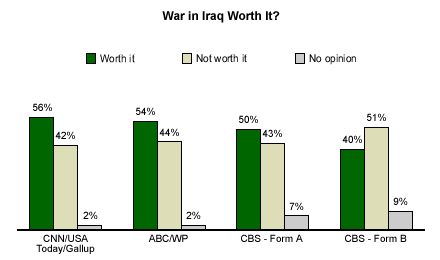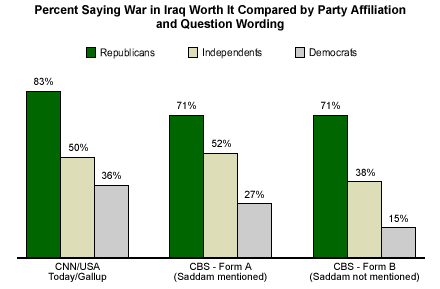Do Americans believe the situation in Iraq was worth going to war over? That is the way the CNN/USA Today/Gallup poll has asked the question over the past several months, and the poll results continue to show a majority saying yes. But there are other ways to get at this sentiment about the "worth" of war, and -- not surprisingly -- different question wordings elicit different patterns of responses.
Shown below are four ways of asking the question. The ABC News/Washington Post (ABC/WP) question is similar to the one asked by CNN/USA Today/Gallup, because neither question mentions any specific costs or benefits to the war.
|
CNN/USA Today/ Gallup |
All in all, do you think the situation in Iraq was worth
going to war over, or not? |
|
ABC News/Washington |
All in all, considering the costs to the United States
versus the benefits to the United States, do you think the war with
Iraq was worth fighting, or not? |
|
CBS -- Form A |
Do you think that removing Saddam Hussein from power was
worth the loss of American life and other costs of attacking Iraq,
or not? |
|
CBS -- Form B |
Do you think that the result of the war with Iraq was worth
the loss of American life and other costs of attacking Iraq, or
not? |
CBS News conducted a split-sample experiment, with half of the sample asked the Form A question while the other half was asked the Form B question. Unlike the ABC/WP and Gallup questions, both CBS questions mention a specific cost of the war (the "loss of American life"). One of the CBS questions (Form A) also mentions a specific benefit (removing Saddam Hussein from power), while the other does not.
Different Questions Different Results
Both the CNN/USA Today/Gallup survey (conducted in mid-November) and the ABC/WP survey (conducted a month earlier) found a clear majority saying the war was worth it -- by 56% to 42%, and 54% to 44%, respectively. Gallup's results a month earlier (Oct. 6-8) showed a 55% to 44% margin, only a point different from the ABC/WP results.

In the CBS question that mentions both the benefit of removing Hussein and the cost of the loss of American life, the public is more evenly divided, with 50% saying the war was worth it, and 43% saying it was not.
In the other CBS question, which mentions the loss of American life but does not mention Hussein, the public says the war was not worth it, by a 51% to 40% margin.
These results show how much people are affected by the wording of the question. There is a 25-point swing in support, depending on whether the Gallup wording (a 14-point margin of support) or the CBS wording in Form B is used (an 11-point margin of opposition). Just mentioning the loss of American lives changes the opinions of many Americans from saying the war was worth it to saying the war was not.
Results Compared by Party Affiliation
The most interesting differences by party affiliation are between the Forms A and B of the CBS poll. Republicans were not affected by question wording (mentioning Hussein's removal or not), while independents and Democrats were.

The results show that 71% of Republicans said the war was worth it, regardless of whether Hussein's removal was mentioned.
However, independents were 14 percentage points less likely to say the war was worth it when Hussein's removal was not mentioned (38% said "worth" it) than when the Iraqi leader's removal was mentioned (52% said "worth" it).
A similar decline of 12 points occurred among Democrats, from 27% saying the war was worth it when Hussein was mentioned, to 15% when his name was not mentioned.
The other comparison worth noting is between the Gallup and CBS wording. When no mention is made of the loss of American lives (Gallup), both Democrats and Republicans are more likely to say the war was worth it than when such costs are mentioned (CBS). Eighty-three percent of Republicans and 36% of Democrats express positive sentiments when asked the Gallup question, while 71% of Republicans and either 27% or 15% or Democrats express the positive sentiments when the CBS questions are asked.
Why are Americans so greatly influenced by question wording? They know soldiers are dying and they know Hussein was removed from power. So, why does the mentioning of such facts in the questions change opinions so significantly?
These are interesting questions, and they deserve careful consideration. But a preliminary answer may be found in another question in Gallup's last poll, which asked how confident (very or somewhat) people were that the war was the right thing to do. Less than half (46%) expressed opinions indicating they were "very" confident in their views, while just over half, 54%, expressed some ambivalence in their judgment -- either that they were only "somewhat" confident or they were unsure.
Generally speaking, when people are ambivalent about an issue, small changes in question wording are more likely to influence them. They frequently re-evaluate their positions based on whatever information seems most relevant at the time. In these situations, the information provided in the question can become the dominant consideration.